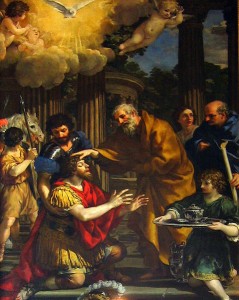Where is Spiritual Direction in Scripture & Tradition?
Dear Father John, Is the idea of spiritual direction found in  scripture? What is the basis for spiritual direction in scripture and/or tradition?
scripture? What is the basis for spiritual direction in scripture and/or tradition?
Do you remember when St. Paul had his encounter with the Lord on the road to Damascus? Taking a look at Paul’s own brief description of that happened will help us answer this question (Acts 22:6-10):
“It happened that I was on that journey and nearly at Damascus when in the middle of the day a bright light from heaven suddenly shone round me. I fell to the ground and heard a voice saying, ‘Saul, Saul, why are you persecuting me?’ I answered, ‘Who are you, Lord?’ and he said to me, ‘I am Jesus the Nazarene, whom you are persecuting.’ The people with me saw the light but did not hear the voice which spoke to me. I said, ‘What am I to do, Lord?’ The Lord answered, ‘Get up and go into Damascus, and there you will be told what you have been appointed to do.’”
Paul’s question, “What am I to do, Lord?” is one of the most beautiful prayers in scripture. They are words we can repeat in our hearts all day long, every day, as we travel the journey of faith. But Jesus’ answer is rather puzzling. Jesus tells him to go into the city and wait for someone to come and tell him what to do. Why didn’t Jesus just tell him right then? Why didn’t Jesus give him another vision with a full list of instructions? We know from the rest of the scriptural narrative that God sent a Christian named Ananias to meet Paul, explain the Gospel to him, heal his blindness, and baptize him. Jesus didn’t do all the work himself; he freely chose to work through others, to give his guidance through other human beings.
Do you remember the remarkable encounter between the Ethiopian Eunuch and the deacon Philip in Acts chapter 8? The Eunuch had been on a pilgrimage to Jerusalem, even though he wasn’t Jewish. He was a high-ranking official (chief treasurer, in fact) in Ethiopia’s royal court. His pilgrimage was over and he was on his way back south to his home country. Suddenly Philip was ordered by the Holy Spirit to catch up to the chariot. When he did, he heard the Eunuch reading the Jewish scriptures – some of the prophecies from Isaiah about the Messiah. (Back then written texts didn’t have punctuation or spaces between words, nor capital and lower case letters – everything was just crowded together on the page. So you had to read out loud in order to figure out, by the sound, the breaks between words and sentences. That’s why Philip “heard” the treasurer reading.) Philip asked the man if he understood what he was reading, and the man answered, wisely, “How could I, unless I have someone to guide me?” Why did the Holy Spirit send Philip to help this searching man find what he was looking for? Why didn’t the Holy Spirit just give him the answer directly?
We could go on and on with similar examples, from both the Old and the New Testaments. Joshua was spiritually tutored by Moses, Elisha by Elijah, David by Nathan, Paul by Barnabas, Timothy by Paul, Mark by Peter… God’s normal mode of operation is to guide and enlighten us by a combination of direct and indirect action; he stirs our souls and open our minds and gives us insights, but he helps us make sense out of them through the assistance of our fellow-travelers, especially those he has called and gifted to make that a primary apostolate.
During the fourth century at the beginning of the monastic movement, the institution of spiritual direction became more formalized. Young monks would receive instruction from older and more experienced monks as they pursued their vocation to perfection. This practice spread throughout Christendom quickly and even lay men and women eventually began to receive spiritual guidance from their confessors. In the years after the Protestant Reformation, the Jesuit order helped bring structure to the practice, and took on spiritual direction as one of their major apostolates. Subsequently, both older, and more recently formed orders have done the same. In the Church’s new ecclesial movements, lay men and women are also being trained in the art of spiritual direction, so that it is more common to see laypeople not only receiving, but also giving regular spiritual guidance.
Why does God choose to work in this way, both directly and also indirectly, through human instruments? Certainly we cannot fathom completely all of his reasons, but one of them is clear: God respects the human nature that he has given us. Because of that human nature, we are both material and spiritual beings, simultaneously matter and spirit. If God were to deal with us only through direct spiritual contact, he would be treating us like angels. But we are not angels. And so, to save us, he came up with the incarnation – reaching out to us by becoming one of us. And he invented the Church, a real institution with a hierarchical structure and sacraments that transmit grace, a spiritual reality, through matter, through material elements (messy and noisy matter too – as anyone who has been up close at a baptism can attest to).
This combination of direct and indirect action on God’s part is particularly clear in the case of the mystics. Jesus spoke directly to their souls, in an ongoing way, but they suffered immensely as they tried to discern how to respond to Jesus, until he gave them a specially anointed spiritual director or confessor. The Diary of St. Faustina beautifully chronicles this kind of painful and confusing journey. How is it that he speaks to them directly, but they can’t find peace and confidence until he gives them a human guide as well? That’s our nature. God made it, God understands it, and God loves it. Blessed be God.


